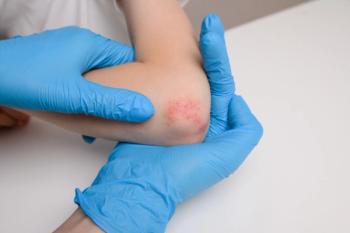
Vitamin D Could Provide Benefit to Patients With Psoriasis
Researchers recommend patients with psoriasis and their dermatologists discuss whether taking a vitamin D supplement is right for them.
According to new data presented by the American Society for Nutrition, levels of vitamin D may play a key role in the severity of psoriasis.
In one of the largest related studies to date,1 researchers conducted an analysis of data from nearly 500 cases of patients with psoriasis. Data was obtained from the National Health and Nutrition Examination Survey (NHNES).
Of more than 40,000 NHNES participants, researchers extracted data from 491 patients with psoriasis. These cases were stratified by year, with 162 cases of psoriasis identified between 2003 and 2006 and 329 cases identified between 2011 and 2014. Further data was collected, including demographic and disease-specific data, such as age, body mass index, gender, race, smoking status, and patient-reported body surface area affected by psoriasis.
However, researchers also extracted data related to patients’ levels of vitamin D. They found that vitamin D deficiency and lower levels of vitamin D could be associated with more severe cases of psoriasis. This was also applicable to patients with a greater body surface area affected by the condition.
“Topical synthetic vitamin D creams are emerging as new therapies for psoriasis, but these usually require a doctor’s prescription,” said Rachel K. Lim in a press release.2 Lim is a current MD candidate at the Warren Alpert Medical School of Brown University.
“Our results suggest that a vitamin D-rich diet or oral vitamin D supplementation may also provide some benefit to psoriasis patients,” she said.
Lim presented the findings in full at the annual meeting for the American Society of Nutrition, NUTRITION 2023, in Boston, Massachusetts, on July 25.
This is not the first time the relationship between vitamin D and psoriasis has been examined. According to Lim, the only existing study to use NHNES data to examine this relationship took place in 2013.
“We were able to add more recent data, which more than tripled the number of psoriasis cases analyzed, making our results more up-to-date and statistically powerful than previously available data,” she said.
Because of this association, researchers recommend that patients with psoriasis and their dermatologists and physicians have discussions about whether taking a vitamin D supplement is right for them.
“With growing public interest in vitamin supplementation, we wanted to further examine the connection between vitamin D levels and psoriasis severity,” said Eunyoung Cho, ScD, in the press release. Cho is an associate professor in the Department of Dermatology at the Warren Alpert Medical School of Brown University and led the research team involved in the recent study.
“Few studies have looked for this association in groups of people, especially in large US populations, or examined this relationship through a clinical nutrition lens,” Cho said.
References
1. Lim RK, et al. Association of serum vitamin D levels and psoriasis severity: An analysis of the US National Health and Nutrition Examination Survey. Presented at: NUTRITION; July 22-25, 2023; Boston.
2. Large study shows link between vitamin D and psoriasis severity. EurekAlert! July 25, 2023. Accessed July 26, 2023. https://www.eurekalert.org/news-releases/995505.
Newsletter
Pharmacy practice is always changing. Stay ahead of the curve with the Drug Topics newsletter and get the latest drug information, industry trends, and patient care tips.























